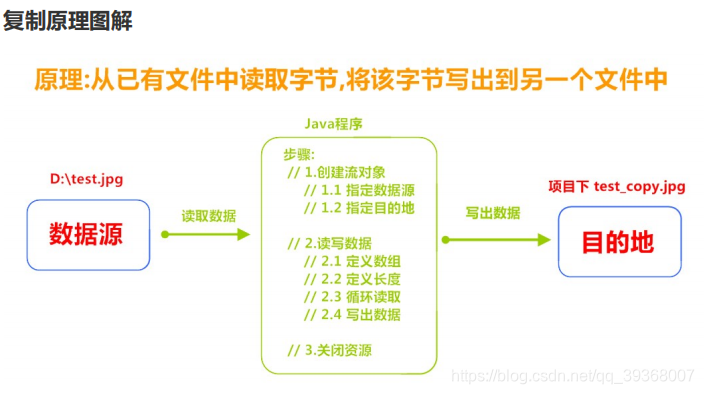字节流练习:图片复制
本文共 1311 字,大约阅读时间需要 4 分钟。


文件复制练习:一读一写
明确:
数据源: c:\\1.jpg 数据的目的地: d:\\1.jpg文件复制的步骤:
1.创建一个字节输入流对象,构造方法中绑定要读取的数据源 2.创建一个字节输出流对象,构造方法中绑定要写入的目的地 3.使用字节输入流对象中的方法read读取文件 4.使用字节输出流中的方法write,把读取到的字节写入到目的地的文件中 5.释放资源package com.itheima.demo03.CopyFile;import java.io.FileInputStream;import java.io.FileOutputStream;import java.io.IOException;public class Demo01CopyFile { public static void main(String[] args) throws IOException { long s = System.currentTimeMillis(); //1.创建一个字节输入流对象,构造方法中绑定要读取的数据源 FileInputStream fis = new FileInputStream("c:\\1.jpg"); //2.创建一个字节输出流对象,构造方法中绑定要写入的目的地 FileOutputStream fos = new FileOutputStream("d:\\1.jpg"); //一次读取一个字节写入一个字节的方式 //3.使用字节输入流对象中的方法read读取文件 /*int len = 0; while((len = fis.read())!=-1){ //4.使用字节输出流中的方法write,把读取到的字节写入到目的地的文件中 fos.write(len); }*/ //使用数组缓冲读取多个字节,写入多个字节 byte[] bytes = new byte[1024]; //3.使用字节输入流对象中的方法read读取文件 int len = 0;//每次读取的有效字节个数 while((len = fis.read(bytes))!= -1){ //4.使用字节输出流中的方法write,把读取到的字节写入到目的地的文件中 fos.write(bytes,0,len); } //5.释放资源(先关写的,后关闭读的;如果写完了,肯定读取完毕了) fos.close(); fis.close(); long e = System.currentTimeMillis(); System.out.println("复制文件共耗时:"+(e-s)+"毫秒"); }}
转载地址:http://rtwnz.baihongyu.com/
你可能感兴趣的文章
mysql加强(5)~DML 增删改操作和 DQL 查询操作
查看>>
mysql加强(6)~子查询简单介绍、子查询分类
查看>>
mysql加强(7)~事务、事务并发、解决事务并发的方法
查看>>
MySQL千万级多表关联SQL语句调优
查看>>
mysql千万级大数据SQL查询优化
查看>>
MySQL千万级大表优化策略
查看>>
MySQL单实例或多实例启动脚本
查看>>
MySQL压缩包方式安装,傻瓜式教学
查看>>
MySQL原理、设计与应用全面解析
查看>>
MySQL原理简介—1.SQL的执行流程
查看>>
MySQL参数调优详解
查看>>
mysql参考触发条件_MySQL 5.0-触发器(参考)_mysql
查看>>
MySQL及navicat for mysql中文乱码
查看>>
MySqL双机热备份(二)--MysqL主-主复制实现
查看>>
MySQL各个版本区别及问题总结
查看>>
MySql各种查询
查看>>
mysql同主机下 复制一个数据库所有文件到另一个数据库
查看>>
mysql启动以后会自动关闭_驾照虽然是C1,一直是开自动挡的车,会不会以后就不会开手动了?...
查看>>
mysql启动和关闭外键约束的方法(FOREIGN_KEY_CHECKS)
查看>>
Mysql启动失败解决过程
查看>>